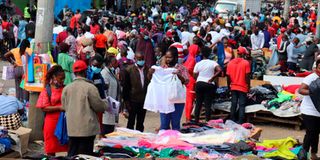EU trash ‘sneaked into Kenya as mitumba’

Second-hand clothe buyers and sellers at Gikomba market in Nairobi on June 13, 2021.
A new report has unearthed a scandal involving the secret dumping of plastic waste disguised as second-hand clothes exported to Kenya by European countries.
The report warns that nylon and polyester mitumba imports are too degraded and are harmful to the environment.
The report titled “Trashion, the stealth export of plastic clothes to Kenya” and released by environmental lobby Clean up Kenya in collaboration with the Wildlight and the Changing Markets foundation details how the importation of tonnes of second-hand clothes has negatively impacted the environment.
According to the report, garment recyclers in the European Union (EU) and the United Kingdom (UK) are using legal loopholes to export to Kenya tonnes of used garments made from cheap synthetic fibres.
Health problems
“The said clothes are either too dirty or damaged to be reused or are culturally and climate inappropriate, creating serious environmental and health problems for vulnerable communities and overburdening the Kenya taxpayer with waste management costs for these rubbish clothing,” noted the report. The report found that a third of the 148 million clothing items shipped to Kenya in 2021 contained plastic, that is nylon and polyester, and were of such low quality that they ended up in the dumpsites or used as rags.
Second-hand clothes dealers in Kenya such as Baltic Textile, trading operating as Think Twice, and Humana imported 32 per cent of the garments from the EU and UK.
Other European companies that exported the used clothing to Kenya are Poland’s Vive Textile Recycling (7.94 per cent), Wtorpol (3.32 per cent), Firm Handlowa Tesso (3.31 per cent) and UK’s Nathans Wastesavers Limited (4.62 per cent), JMP (3.86 per cent) and Cookstown Textile Recyclers (3.78 per cent)
The report accused charities such as the British Heart Foundation Oxfam, Cancer Research UK, Salvation Army, Bamardos and Sue Ryder of being linked to the recycling companies that ship the waste to Kenya.
Germany is said to be the leader exporter of second-hand clothes at 41.27 per cent followed by Poland (24.6 per cent), UK (23 06 per cent) Hungary (3.2 per cent, Italy (2.5 per cent), Belgium (1.82 per cent), Lithuania (1.42 per cent) Estonia (0.67 per cent) France (0.5 per cent) and Ireland (0.42 per cent). The total value of the export was Sh3.25 billion.
Global Treaty for Plastics
Clean Up Kenya Patron Betterman Simidi Musasia while releasing the report last Friday said it came at a crucial time when the international community is involved in the a Global Treaty for Plastics. Kenya is in the process of developing of a legal framework for the management of waste with the enactment of the Sustainable Waste Management Act of 2021.
Mr Simidi regretted that the EU and UK was secretly contravening the Basel convention on the transboundary transportation of plastic waste. He called upon the Kenya government to issue a statement regarding the secret importation of plastic waste despite making few steps towards dealing with the menace.





